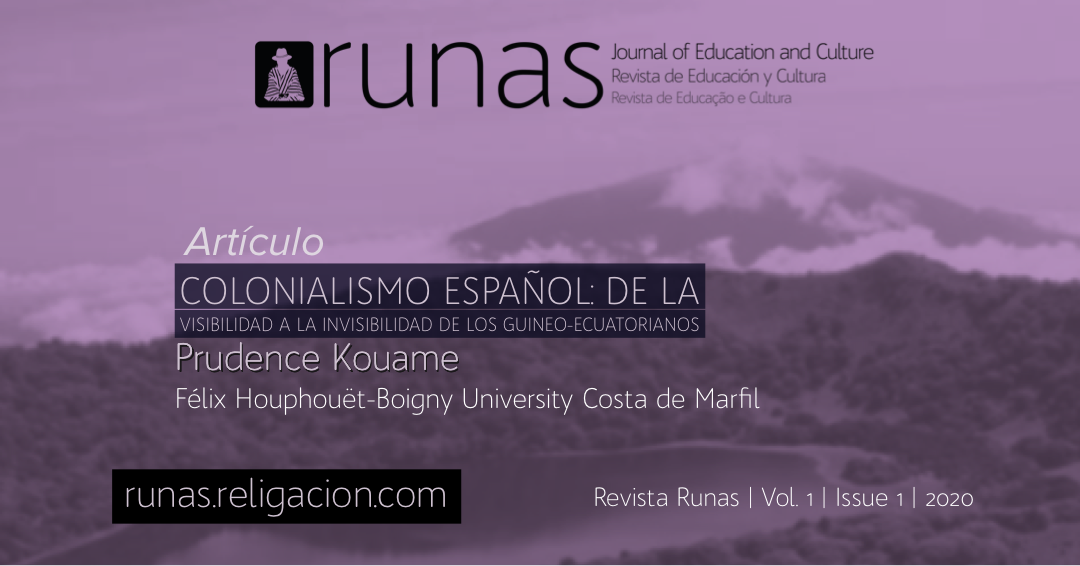Abstract
How did colonialism come to influence the Equatorial Guineans to the point of making them invisible? What are the methods used by the latter to reaffirm their visibility? Faced with such questions, the objective of this study is to expose both the elements that characterize the visibility of the Equatorial Guineans and those that reveal their invisibility. The hypothesis that serves as a common thread is that culture and religions, objects of its visibility, ways of understanding the world and its life have been influenced by the Spanish presence. The historical, explanatory, and descriptive methods are used to decipher that, after the conquest and colonization of Equatorial Guinea by Spain, the locals had their cultures with their own characteristics, a factor of their visibility. But colonialism is going to corner these cultures giving free rein to Spanish culture and transforming the colonized into objects of discrimination. In addition to denying all the patterns of life and thought of the indigenous, the colonizer did not want to make the colonized his like and bearer of the cultural values of his country. What engendered sometimes conflicting relationships between them. This leads us to analyze the way in which colonialism makes the Ecuadorian-Guinean and their culture invisible in their own territory, as well as the methods used by the new generations to make themselves visible.
References
Aixelà C. Y. (2015). Tras las huellas del colonialismo español en Marruecos y Guinea Ecuatorial. Consejo Superior de Investigaciones Científicas.
Campos, S. A. (2003). Nacionalismo anticolonial en Guinea Ecuatorial: de españoles a guineanos. Araucaria. Revista Iberoamericana de Filosofía, Política y Humanidades, 5(9), 175-195. https://www.redalyc.org/articulo.oa?id=28250910
Cardoso, J. E. (2015). Esclava y ama. Montevideo: Cartelera.
Clarence-Smith, W., & Gervase, W. (1991). The economic dynamic of Spanish imperialism in the nineteenth and twentieth century. Itinerario, (15), 71- 90. https://doi.org/10.1017/S0165115300005787
CONVERGENCIA PARA LA DEMOCRACIA SOCIAL GUINEA ECUATORIAL (2018, noviembre). Historia abreviada del proceso de la independencia de Guinea Ecuatorial. https://url2.cl/Ih9xh
Creus, B. J. (2014). Action missionnaire en Guinée Equatoriale, 1858-1910, mémoire et naïveté de l’empire. L’Harmattan.
Ela Abeme, F. (1983). Guinea: Los Últimos Años. Centro de la Cultura Popular Canaria.
Ela Ondo Onguene, C. (2019). Mensaje del Jefe de Estado a la población con motivo del Día de la Independencia. Oficina de Información y Prensa de Guinea Ecuatorial. https://www.guineaecuatorialpress.com/noticia.php?id=14106.
Guzmán, Á. J. R., & Navarro Cerrillo, R. M. (2004). El método descriptivo en los estudios de restauración natural de la vegetación en campos abandonados. Aplicación al caso de los olivares abandonados de Andalucía. Cuadernos Sociedad Española de Ciencias Forestales, (17), 169-173. http://secforestales.org/publicaciones/index.php/cuadernos_secf/article/view/9417
Mañe, A. V. (2012). Vestido, identidad y folklore: la invención de un vestido nacional de Guinea Ecuatorial. Revista de Dialectología y Tradiciones popular, 67(1), 267-296. http://doi.org/10.3989/rdtp.2012.10
Naya, G. (2019). Guinea, el documental prohibido: "Vivir en Guinea Ecuatorial es revivir el franquismo, pero con clima tropical". El salto. https://bit.ly/39ozFoH
Nerín, G. (2010). Fronteras múltiples, exclusiones múltiples: los contradictorios usos de la identidad por parte del partido democrático de Guinea Ecuatorial (2004-2010). [Congreso] 7th Congress of African Studies, Lisboa, Portugal. http://hdl.handle.net/10071/2351
Nerín, G. (1998). Guinea Ecuatorial, historia en blanco y negro. Hombres blancos y mujeres negras en Guinea Ecuatorial (1843-1968). Empúries.
Ndongo, B. D. (1977). Historia y tragedia de Guinea Ecuatorial. Cambio 16.
Nkama, B. O. (s.f.). Nuestra culturas, dossier n°3. ASGG, Comisión Europea, UNICEF. https://www.gitanos.org/publicaciones/tolerancia/pdf/12_los%20bantu.pdf
Nsue, M. (2007). Historia de la colonización y de la descolonización de Guinea Ecuatorial por España. Grafillés.
Ogou, A. (Dir.) (2018). Invisibles [serie de televisión]. Canal+Afrique/ Fonds d’aide de l’OIF, TV de La Rochelle.
Owono Asangono, E. A. (1994). El proceso democrático de Guinea Ecuatorial. CEIBA.
Prévoteau, M., & Utard, J. (2005). La recherche documentaire in manuel de la bibliographie générale. Editions de Cercle de la Librairie.
Rizo, E. G. A., & Ponte, L. (2014). Guinea Ecuatorial como pregunta abierta: hacia el diálogo entre nuestras otredades. Revista Iberoamericana, 80(248-249), 745-759.
Rodríguez, L. J. (1991). El método explicativo en las epistemologías regionales de la actividad física, Apunts: Educación física y deportes, (24), 19-26. https://www.revista-apunts.com/apunts/articulos//24/es/024_019-026_es.pdf
Ruiz Berrio, J. (1976). El método histórico en la investigación histórica de la educación. Revista Española de Pedagogía, 34(134). 449-475. https://bit.ly/3jrYlRI
Sampieri, R.H., & Collado, F. C. (1998). Metodología de la investigación. Mc Graw Hill interamericana.
Sánchez, P. A. (2000). Pallassos i monstres. Història tragicòmica de 8 dictadors africans. La Campana.
Wells, H. G. (1897). El hombre invisible. Pearson’s Magazine.
Yao, J.-A. (2014). Afrodescendientes en América, de esclavos a ciudadanos. Mundo Negro.
Yapi, K. M. (2018). De la "invisibilidad" a la "visibilidad": el negro y las expresiones del cuerpo. In J.-A. Yao, V. Lavou Zounqbo, & L. Mancha San Esteban. (Aut.) Áfricas y Américas: ideas y vuelta, reevaluación y perspectivas actuales (pp. 179-188). Universidad de Alcalá.

This work is licensed under a Creative Commons Attribution-NonCommercial-NoDerivatives 4.0 International License.
Copyright (c) 2020 Prudence Kouame






